

Inquiry Based Learning Lesson Plans. CIBL - Center for Inquiry-Based Learning. Science Outreach. Scientific Science Teaching The Fundamental Premise The Standards The Learning Goals of a Lesson Plan.
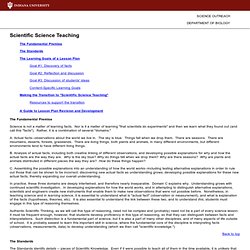
Inquiry Based Science Lesson Plans. Exemplars inquiry-based investigations provide teachers and administrators with a way of teaching and assessing science-process and communication skills.
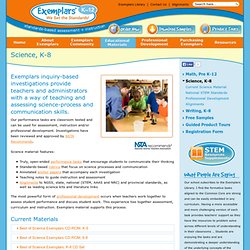
Our performance tasks are classroom tested and can be used for assessment, instruction and/or professional development. Investigations have been reviewed and approved by NSTA Recommends. Science material features: Truly, open-ended performance tasks that encourage students to communicate their thinkingStandards-based rubrics that focus on science processes and communicationAnnotated anchor papers that accompany each investigationTeaching notes to guide instruction and assessmentAlignments to NGSS, state, national (STEM, AAAS and NRC) and provincial standards, as well as leading science kits and literature links The most powerful form of professional development occurs when teachers work together to assess student performance and discuss student work.
Current Materials. Template. Why create lesson plans?
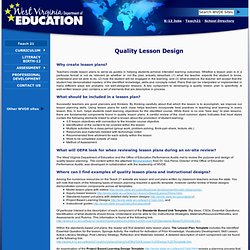
Teachers create lesson plans to serve as guides in helping students achieve intended learning outcomes. Whether a lesson plan is in a particular format is not as relevant as whether or not the plan actually describes (1) what the teacher expects the student to know, understand and be able to do, (2) how the student will be engaged in the learning, and (3) what evidence the teacher will accept that the student has demonstrated mastery of the identified knowledge, skills and concepts noted. Plans that can be interpreted or implemented in many different ways are probably not well-designed lessons. A key component to developing a quality lesson plan is specificity. A well-written lesson plan contains a set of elements that are descriptive in process.
Inquiry-based Learning: Demonstration. Kindergartenrecyclingwebquest.bgsu.wikispaces.net/file/view/Inquiry+Based+Lesson+Plan.pdf. Flexibility In Inquiry Based Teaching. Inquiry based lesson plan templates. Teach21 CSO Information - Science - Conceptual Biology. Connected Learning Principles. We are living in a historical moment of transformation and realignment in the creation and sharing of knowledge, in social, political and economic life, and in global connectedness.
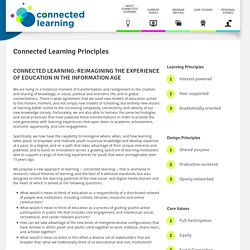
There is wide agreement that we need new models of education suited to this historic moment, and not simply new models of schooling, but entirely new visions of learning better suited to the increasing complexity, connectivity, and velocity of our new knowledge society. Fortunately, we are also able to harness the same technologies and social processes that have powered these transformations in order to provide the next generation with learning experiences that open doors to academic achievement, economic opportunity, and civic engagement. What would it mean to think of education as a responsibility of a distributed network of people and institutions, including schools, libraries, museums and online communities? - Create a Culture of Questioning and Inquiry. 4 Comments August 14, 2013 By: Guest Blogger Nancy White Aug 13 Written by: 8/13/2013 6:00 PM ShareThis I have often suggested to teachers that when students have access to technology, whether it is provided by the school in a 1:1, BYOD, or simply the smart phone in their pocket, there should never be a question that goes unanswered –or un-followed.
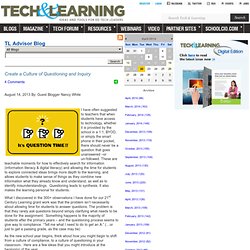
What I discovered in the 300+ observations I have done for our 21st Century Learning grant work was that the problem isn’t necessarily about allowing time for students to answer questions. As the new school year begins, think about how you might begin to shift from a culture of compliance, to a culture of questioning in your classroom. Why Inquiry Learning is Worth the Trouble. Visualization of SLA principal Chris Lehmann's 2011 talk: guiding kids' to thinking about how they think.
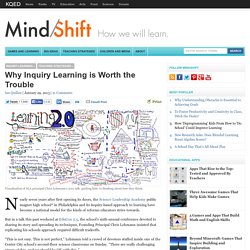
Nearly seven years after first opening its doors, the Science Leadership Academy public magnet high school* in Philadelphia and its inquiry-based approach to learning have become a national model for the kinds of reforms educators strive towards. But in a talk this past weekend at EduCon 2.5, the school’s sixth-annual conference devoted to sharing its story and spreading its techniques, Founding Principal Chris Lehmann insisted that replicating his schools approach required difficult tradeoffs. “This is not easy. This is not perfect,” Lehmann told a crowd of devotees stuffed inside one of the Center City school’s second-floor science classrooms on Sunday.
Creating Classrooms We Need: 8 Ways Into Inquiry Learning. If kids can access information from sources other than school, and if school is no longer the only place where information lives, what, then happens to the role of this institution?
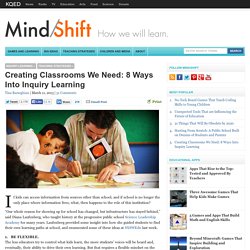
“Our whole reason for showing up for school has changed, but infrastructure has stayed behind,” said Diana Laufenberg, who taught history at the progressive public school Science Leadership Academy for many years. Laufenberg provided some insight into how she guided students to find their own learning paths at school, and enumerated some of these ideas at SXSWEdu last week. 1. BE FLEXIBLE. The less educators try to control what kids learn, the more students’ voices will be heard and, eventually, their ability to drive their own learning.
Laufenberg recalled a group of tenacious students who continued to ask permission to focus their video project on the subject of drugs, despite her repeated objections. 2. Laufenberg’s answer: Get them curious enough in the subject to do research on their own. 3. 4. 5. 6. 7. Inquiry Learning Vs. Standardized Content: Can They Coexist? By Thom Markham As Common Core State Standards are incorporated from school to school across the country, educators are discussing their value.
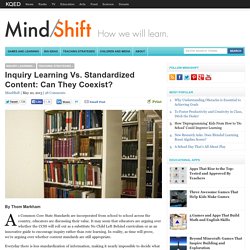
It may seem that educators are arguing over whether the CCSS will roll out as a substitute No Child Left Behind curriculum or as an innovative guide to encourage inquiry rather than rote learning. In reality, as time will prove, we’re arguing over whether content standards are still appropriate. Everyday there is less standardization of information, making it nearly impossible to decide what a tenth-grader should know.
The Challenges and Realities of Inquiry-Based Learning. Inquiry Learning Teaching Strategies Getty By Thom Markham Teachers in a rural southeast Michigan high school were recently discussing the odd behavior of the senior class.
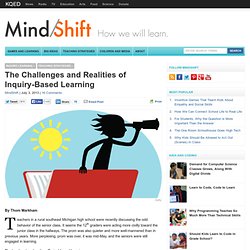
It seems the 12th graders were acting more civilly toward the junior class in the hallways. How to Trigger Students’ Inquiry Through Projects. Inquiry Learning Teaching Strategies Krauss/Boss By Jane Krauss and Suzie Boss Excerpt from Thinking Through Project-Based Learning: Guiding Deeper Inquiry, published by Corwin, 2013.
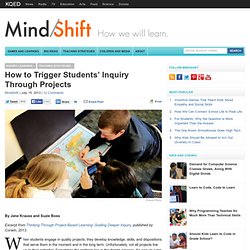
When students engage in quality projects, they develop knowledge, skills, and dispositions that serve them in the moment and in the long term. Unfortunately, not all projects live up to their potential. With more intentional planning, we can design projects that get at the universal themes that have explicit value to our students and to others.
There are several ways to start designing projects. We have condensed the project design process into six steps. How to Trigger Students’ Inquiry Through Projects.